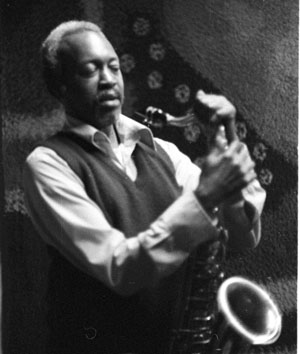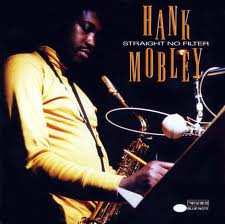Soft Impressions – Hank Mobley
A minor blues with that unmistakable Mobley funk.
- Recording: Hank Mobley - Straight, No Filter
- Recorded on: June 17, 1966
- Label: Blue Note (CD 5-27459)
- Concert Key: D minor
- Vocal Range: , to
- Style: Swing (medium)
- Trumpet - Lee Morgan
- Tenor Sax - Hank Mobley
- Piano - McCoy Tyner
- Bass - Bob Cranshaw
- Drums - Billy Higgins
0:00
0:00
Buy MP3
Video
- Description
- Historical Notes
- Solos
- Piano Corner
- Bass Corner
- Drum Corner
- Guitar Corner
- Inside & Beyond
- Minus You
Laid back and inexorably swinging, this minor-key blues is classic Mobley. The head is not quite as overtly funky as Hipsippy Blues or My Groove, Your Move, but its subtle sassiness is still appealing. The rhythm section plays with a 2-feel for the head, with a funky shuffle in the drums while the bass hints at a triplet feel underneath. The melody's continuous triplet motion builds up intensity throughout the head, which is released with rhythm section hits in the last four measures.
There are a few added passing chords in the head. In the solos, a tasty substitution is retained from the head for the eighth measure: F♯ minor to B7, a tritone sub II-V7 leading to B♭7 for the turnaround. This can allow for harmonic experimentation, as in Lee Morgan and McCoy Tyner's solos, but also keeps harmonic interest when sticking to a simpler blues form.
Harmony notes are included in each edition when the horns break into harmony.
There are a few added passing chords in the head. In the solos, a tasty substitution is retained from the head for the eighth measure: F♯ minor to B7, a tritone sub II-V7 leading to B♭7 for the turnaround. This can allow for harmonic experimentation, as in Lee Morgan and McCoy Tyner's solos, but also keeps harmonic interest when sticking to a simpler blues form.
Harmony notes are included in each edition when the horns break into harmony.
"Straight, No Filter" was recorded at the legendary Van Gelder Studio in Englewood Cliffs.
This song is yet another example of Hank's writing with individual players in mind, subtly tailored to their own styles; in this case, Billy Higgins' classic 2-feel is on display as well as Lee Morgan's unique phrasing. Hank and Billy both played on two of Lee's albums later that year: "Charisma," recorded in September with Jackie McLean, Cedar Walton and Paul Chambers, and "The Rajah," a quite obscure album recorded exactly two months after that with the same personnel minus McLean.
This "Straight, No Filter" session was the second to last Mobley-led session with Lee Morgan. The last was the rare "Third Season" from February 1967; check out Boss Bossa from that album.
This song is yet another example of Hank's writing with individual players in mind, subtly tailored to their own styles; in this case, Billy Higgins' classic 2-feel is on display as well as Lee Morgan's unique phrasing. Hank and Billy both played on two of Lee's albums later that year: "Charisma," recorded in September with Jackie McLean, Cedar Walton and Paul Chambers, and "The Rajah," a quite obscure album recorded exactly two months after that with the same personnel minus McLean.
This "Straight, No Filter" session was the second to last Mobley-led session with Lee Morgan. The last was the rare "Third Season" from February 1967; check out Boss Bossa from that album.
Related Songs
Email Send Soft Impressions to a friend
Send this page to a friend via email. Add your name or email in the first field. In the second, add one or more email addresses, separated by a comma.

Hank Mobley
July 7, 1930 – May 30, 1986
Hank Mobley is one of the most acclaimed tenor saxophonists in modern jazz history. He is recognized by musicians and critics alike as one of the most important and eloquent jazz instrumentalists of all time. He recorded well over 100 of his own original compositions and left an indelible mark on the post-bop jazz scene. Read more...
There was a problem.
...

